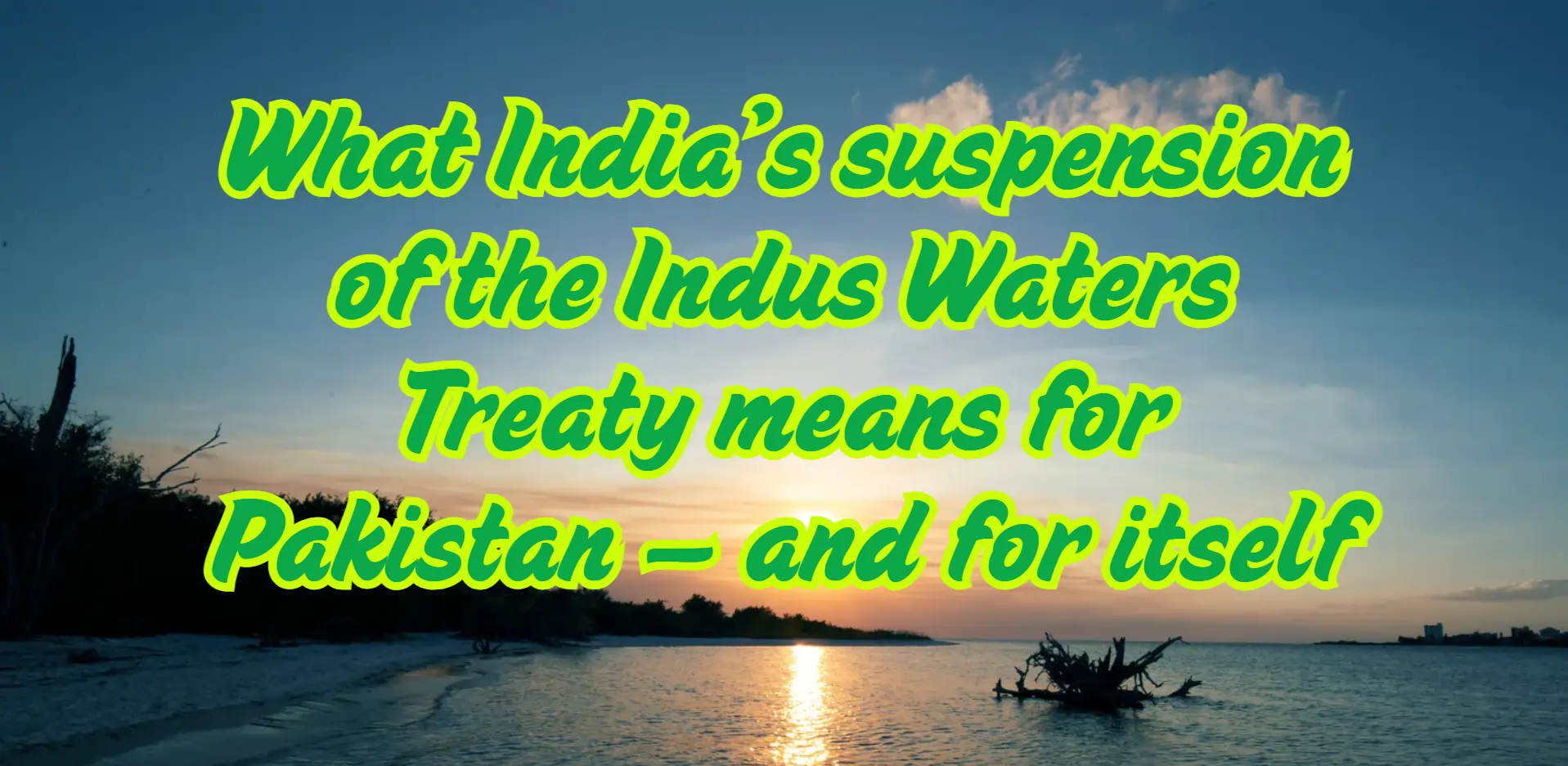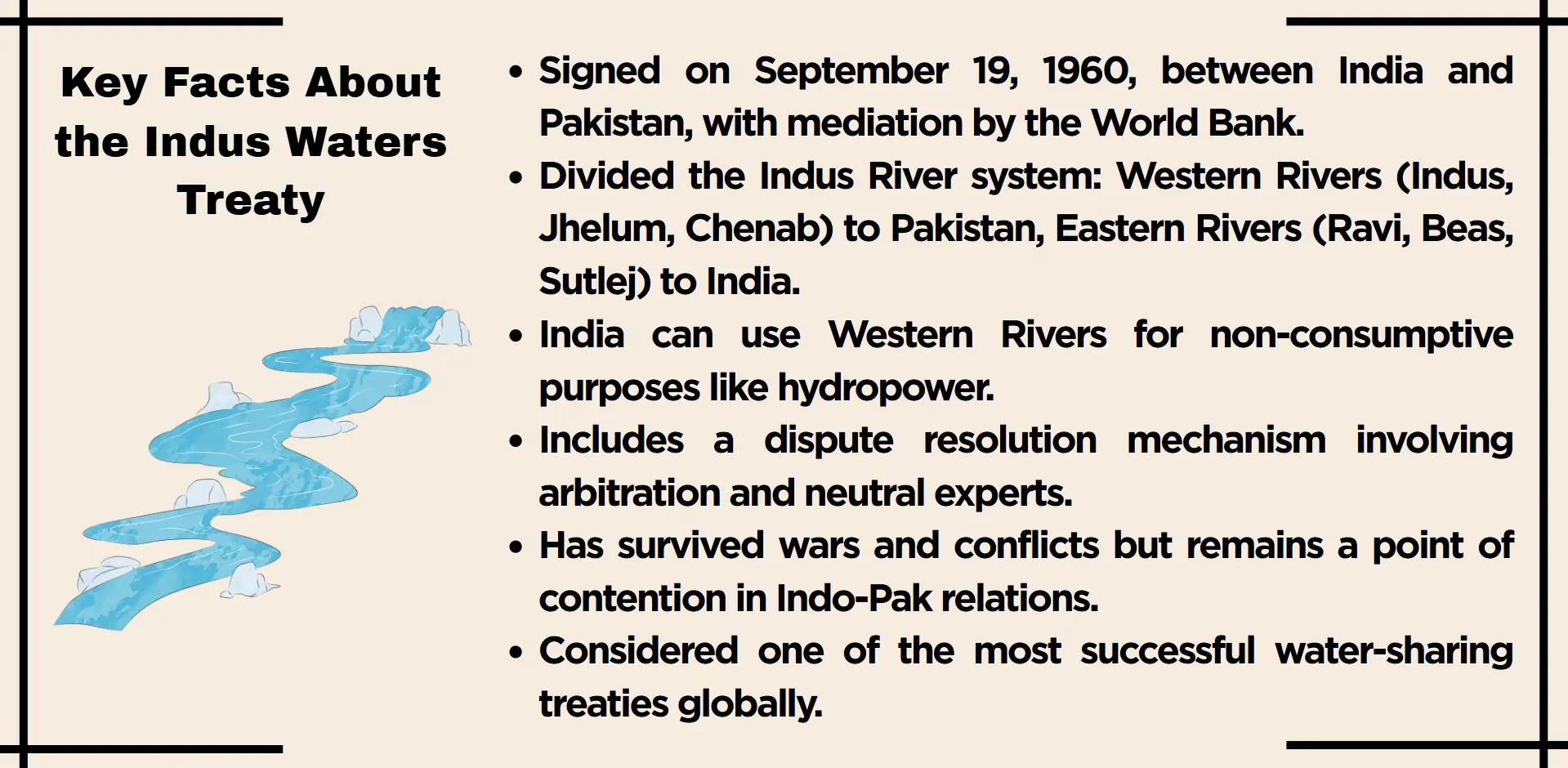Through its Indus Waters Treaty decision India transformed South Asian regional dynamics by jeopardizing Pakistan's water security system and providing new strategic chances to increase its regional power.

The main framework for water allocation that governs the management of the Indus River system between India and Pakistan is the 1960 Indus Waters Treaty. Despite historical conflicts and political tension between the two nations the World Bank helped establish the Indus Waters Treaty which remains considered one of the most successful cases of bilateral cooperation. The Indian suspension of the treaty represents a substantial turn in South Asian politics which questions future water security together with diplomatic ties and geopolitical system stability in the region. Water plays an essential role in national operations but Pakistan will encounter water resource deficits which will threaten both industrial and agricultural sectors as well as average citizens. India needs to evaluate how this strategic advancement impacts its relations with Pakistan while factoring in possible conflicts increase. This Article evaluates the sweeping effects that India's suspension of the Indus Waters Treaty imposed on Pakistan while examining its security consequences for India.
Background of the Indus Waters Treaty
The treaty was mediated by the World Bank. In the year 9060 is was signed by both the nations. This treaty was formed to distribute water quantities from the Indus River system while providing fair water usage to Pakistan and India despite their political disagreements. The Indus Waters Treaty represents one of the few enduring international agreements between these two nations despite their on-going disagreements and disputes.
Historical Context and Signing of the Treaty
Water allocation developed into a heated problem that emerged after British India separated into India and Pakistan throughout the period beginning from 1947. The Indus River together with its tributaries crossed both countries leading to disagreements about water resource permissions.

Role of the World Bank in Mediation
The World Bank established neutral arbitration because it saw the necessity of fair proceedings between India and Pakistan. The treaty stated that India would have jurisdiction over the Eastern Rivers, which included the Ravi, Beas, and Sutlej, while Pakistan would have control over the Western Rivers, which included the Indus, Jhelum, and Chenab. The World Bank organized the establishment of vital water-related infrastructure for Pakistan's requirements.
The water-sharing mechanism
The agreement allowed India to sustainably manage Western Rivers for non-consumptive operations including hydroelectric power production, irrigation and navigation activities which did not affect water supply to Pakistan. The agreement included mechanisms which enabled dispute resolution by means of arbitration and the appointment of neutral experts.
Past Conflicts and Disputes
Since 1948 various water-related conflicts have developed mainly because of Indian hydroelectric operations undertaken on Western Rivers. Multiple instances of international arbitration have occurred because Pakistan expressed treaty violation concerns. The two nations continue to depend on the treaty as their fundamental water diplomatic foundation even though disputes have occasionally appeared.
Reasons behind India’s Suspension of the Treaty
The IWT suspension made by India created a notable shift in political dynamics across South Asia. This strategic move by India to suspend the treaty during its decades in existence was triggered by numerous political strategic challenges together with security and economic aspects.
Recent decision
On Wednesday, New Delhi suspended the Indus Waters Treaty (IWT), which has withstood four wars, decades of cross-border terrorism by Pakistan against India, and a lengthy history of hostility between the two nations, for the first time. A day after the Pahalgam tourist attack, in which 26 people were killed by Pakistani terrorists, India made its decision.

Escalating Political and Security Tensions
India stopped its implementation of the treaty due to worsening political conditions between itself and Pakistan. India has reconsidered its support for agreements with Pakistan because enhanced conflicts across borders especially in Jammu and Kashmir have become more intense. India perceives the treaty as virtually providing Pakistan with benefits instead of protecting its own security concerns due to its multiple episodes of violent disputes together with terrorism claims.
Water as a Strategic Lever in Geopolitics
The scarcity of water combined with demands for better domestic water management gives India the chance to use the treaty as an advantage through updated terms. The increased Indian control over water distribution efforts seeks maximum agricultural and industrial environmental performance within the country.
Economic and Infrastructure Considerations
Interspecies tensions with Pakistan have arisen as a result of India's construction of hydroelectric facilities along the Indus River valley, specifically in relation to the Kishanganga and Ratle hydroelectric projects. The suspension of the treaty allows India to concentrate on developing its infrastructure while maximizing its domestic water resources for power generation purposes to meet rising energy needs independently.
International and Diplomatic Ramifications
India demonstrates its readiness to confront past agreements by showing its dedication to protect national interests through this diplomatic transition. Pakistan needs to begin dialogue as worldwide bodies like World Bank become involved in understanding regional changing water security standards.
Immediate Impact on Pakistan
The Indian suspension of the Indus Waters Treaty creates significant difficulties for Pakistan because the Indus River supplies the country’s basic needs for farming operations and water consumption together with generating its energy. Pakistan now faces uncertain future water supplies and current water shortage conditions because the treaty no longer controls the River's water movement.
Agricultural Disruptions and Water Shortages
Pakistan’s economy depends on agriculture yet it depends entirely on uninterrupted water from the Indus, Jhelum and Chenab rivers for this sector to function. The implementation of water flow limitations would create trouble with irrigation leading to lower production of wheat, rice and sugarcane crops. The population of Punjab and Sindh experience falling agricultural yields while their food security condition deteriorates and economic stability weakens.

Energy Crisis and Hydropower Limitations
The Tarbela and Mangla hydroelectric projects together with other hydroelectric projects in Pakistan depend on continuous water flows from the Indus system. Water level decreases would negatively affect power generation causing existing electrical problems to intensify which would require Pakistan to sustain its usage of costly fossil fuels. The combined effects of power generation restrictions and hydroelectric power problems would impose limitations on all aspects of Pakistani life ranging from industrial operations to business operations and everyday living.
Economic and Social Consequences
Water scarcity goes beyond logistical problems since it triggers both political and social chaos in affected areas. Unresolved water shortages in Pakistan will lead to increased prices of basic items which mostly burden poor residents. The combination of weak agricultural production and insufficient energy resources would impede Pakistan's economic development and force the government to find emergency measures.
Pakistan's urgent responses concerning water security will establish the nation's future diplomatic framework as well as its resource management practice.
Implications for India
The decision of India to suspend the Indus Waters Treaty (IWT) marks an important change in regional relationships but creates new strategic advantages and risks for all parties involved. The enhanced control of Indian water resources through this move creates diplomatic risks together with environmental issues.
Strengthened Water Sovereignty and Resource Utilization
The suspension allows India to maximize usage of its Eastern Rivers (Ravi, Beas, Sutlej) without any operational boundaries. The strategic change enables India to fulfil its expanding agricultural and industrial requirements through improved water distribution for irrigation and power production and urban water delivery systems. The removal of treaty constraints allows water storage projects together with water conservation efforts to advance.
Economic and Infrastructure Advancements
The Indus River system has been the target of intensive hydroelectric developments through substantial investments from India. The treaty suspension may let India develop new facilities for building dams and reservoirs which will help boost renewable energy output. These developments would establish better energy security while lessening fuel dependence and building stronger national electricity networks.
Geopolitical and Diplomatic Consequences
The gain in leverage from treaty non-enforcement might cause India to suffer deteriorated relationships with Pakistan along with China and International organizations including the World Bank. When the nation changes water distribution its actions may prompt diplomatic scrutiny from other nations and negatively affect international trade cooperation and military partnership possibilities. Regional instability will likely rise because Pakistan could launch counter-measures following heightened diplomatic tensions.
Environmental and Sustainability Challenges
The absence of proper regulation during water distribution modifications creates environmental stress which endangers biological diversity stability for India as well as its neighbouring areas. During disruptions of river flow biodiversity and groundwater supply and communities living are affected. India requires the establishment of sustainable water management systems to protect its environment during future periods.
Future Strategic Considerations
The treaty suspension by India functions as a broader indicator of changing regional diplomatic initiatives. India has gained sovereignty through its decision but must handle security and diplomatic issues to maintain stability along with sustainable resource management during upcoming years.
Legal and Environmental Considerations
India’s suspension of Treaty raises various legal and environmental concerns. By implementing this decision the country endangers existing international water-sharing pacts while creating environmental risks for the entire region's ecological balance.
Legal Framework Governing Water Treaties
Customary international law protects international water treaties including the IWT due to its principle which provides balanced water resource sharing between neighbouring countries. An isolated Indian decision can result in Pakistani resort to legal action directed either to the International Court of Justice (ICJ) or the Permanent Court of Arbitration (PCA). Appeals through arbitration solved crises between Kishanganga and Baglihar hydropower projects so legal options remain available for potential future cases.
Possible Legal Challenges and Diplomatic Responses
Pakistan intends to employ international mediation together with provisions from the United Nations Watercourses Convention to establish India's infringement of vital water flow. The water quantity modifications in Indian rivers lead both nations to accuse each other of treaty breaches which deteriorate their diplomatic relationships. As the founding party behind the treaty arrangement the World Bank remains capable of stepping in and resolving give rise to disputes.
Environmental Consequences of Treaty Suspension
The quick redistribution of water supplies between adjacent countries harms natural aquatic life in rivers, reduces biodiversity and makes soils less fertile. The water shortage condition in Pakistan will destroy Pakistan's lands yet India's redirection of canals will result in salty and waterlogged regions. Living organisms in river systems remain vulnerable because they depend on their natural water cycle system.
Long-Term Sustainability and Mitigation Efforts
The protection of the environment demands from India the creation of advanced water management systems with efficient irrigation systems and controlling dam operations together with programs establishing ecological protection. Indian authorities alongside Pakistan should develop lasting cooperative strategies to stop environmental disasters while preserving resources which both nations share.
Regional and Global Repercussions
India's termination of the Indus Waters Treaty (IWT) operation generated various vital consequences which spread beyond the national borders of both nations. As a result of the geographical change in South Asia a significant diplomatic crisis emerges leading to economic instability while altering worldwide attitudes regarding the governance of shared water resources.
Impact on South Asian Geopolitics
The decision by India creates further tensions in an unstable region which increases hostility between its Delhi and Islamabad. Issues with water scarcity in Pakistan are expected to worsen internal disorder thus affecting how Pakistan conducts border affairs and fights its military battles. The water-sharing arrangements between India and other neighbours may experience evaluation after this development.
China’s Role and Regional Alliances
China takes advantage of its substantial power in South Asia to improve relations with Pakistan through providing water infrastructure development and financial support. The move could turn out to create additional diplomatic activities because China experiences water conflicts with India across their Brahmaputra River border. The SAARC alliance together with other regional organizations shows potential to become involved with water security matters.
Economic and Trade Consequences
Water supply disruptions would produce adverse effects on Pakistan's agricultural sector and industrial sector which would lead to economic imbalance and serious financial problems for the country. Bilateral trade between India and other countries could experience negative effects because of this decision which would impact different sectors including textile production, food and energy industries. The increased tensions between India and Pakistan often serve as a financial risk indicator which affects international market investments.
International Attention and Global Water Governance
The international community including United Nations and World Bank institutions will likely step forward to facilitate discussions about trans-boundary water-sharing principles because of this development. These circumstances presently reshape global agreements regarding international water treaties which will shape additional agreements throughout African countries and European nations and the regions of the Middle East.
Conclusion
This critical diplomatic decision by India to suspend the Indus Waters Treaty fundamentally transforms both South Asian foreign relations and water resource protection for Pakistan. As India works to expand its resource governance Pakistan needs to solve urgent problems stemming from agricultural and economic disturbances. International authorities scrutinize the diplomatic implementation due to its legal framework and environmental effects. Three potential solutions for the future could involve negotiations between governments alongside sustainable water planning and regionally collaborative efforts. The success of both nations depends on preventing instability together with achieving fair distribution of resources. The water governance direction for the region will depend on how this decision either intensifies conflicts or revitalizes dialogue between neighbouring countries.